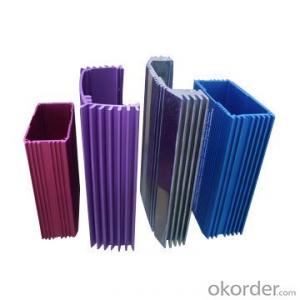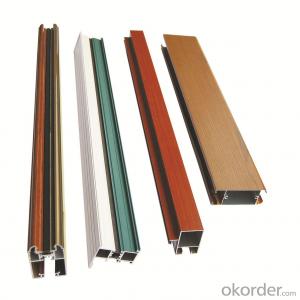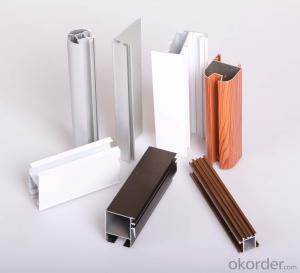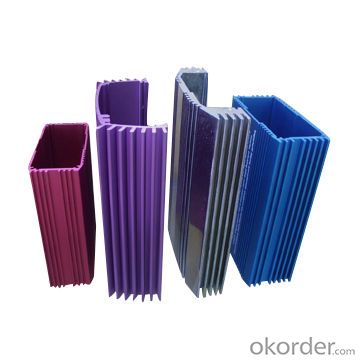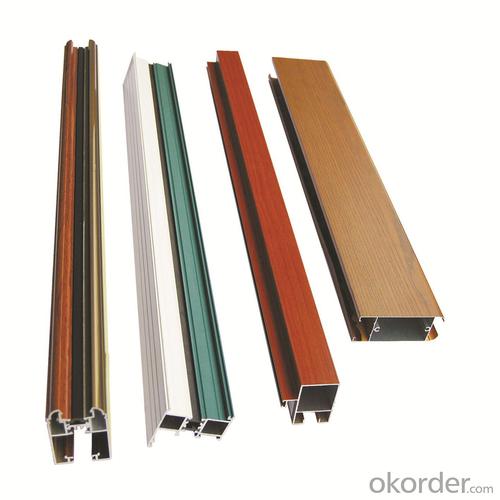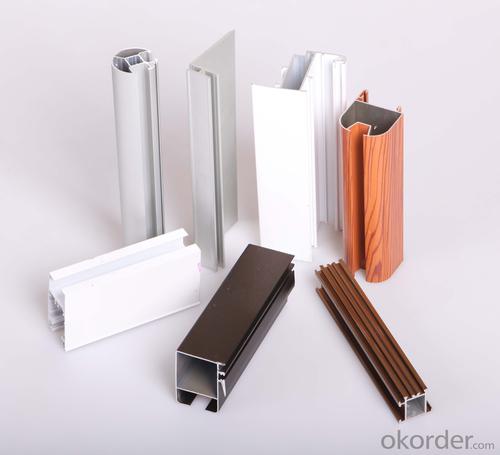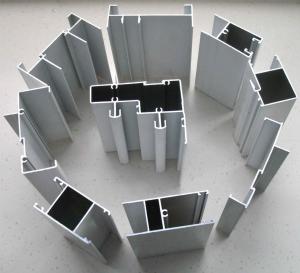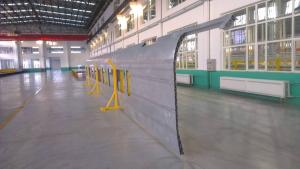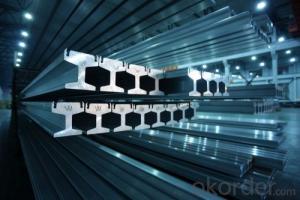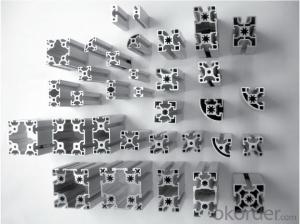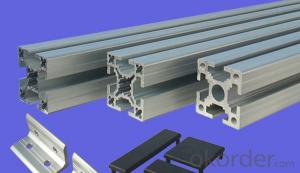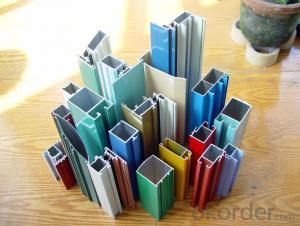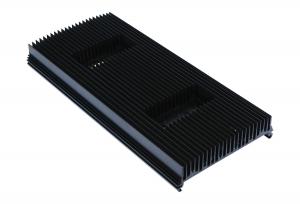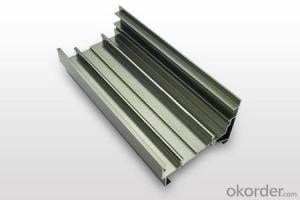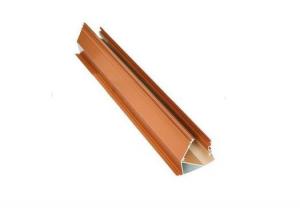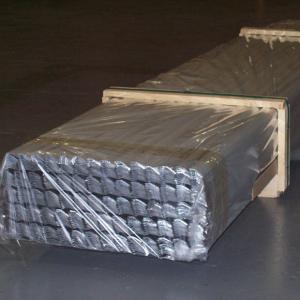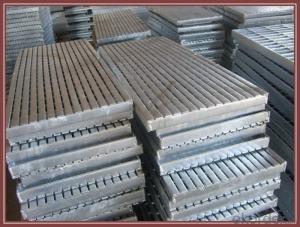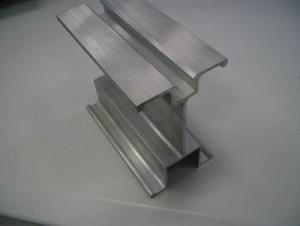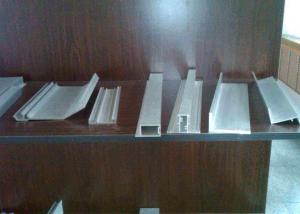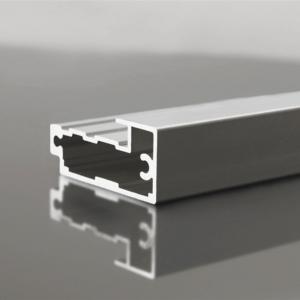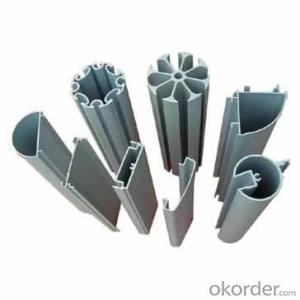Aluminum Profiles for Sale - Perfiles en Colors
- Loading Port:
- China Main Port
- Payment Terms:
- TT OR LC
- Min Order Qty:
- -
- Supply Capability:
- -
OKorder Service Pledge
OKorder Financial Service
You Might Also Like
Aluminium is a relatively soft, durable, lightweight, ductileand malleablemetalwith appearance ranging from silvery to dull gray, depending on the surfaceroughness. It is nonmagnetic and does not easily ignite. A fresh film ofaluminium serves as a good reflector (approximately 92%) of visible lightand an excellent reflector (as much as 98%) of medium and far infraredradiation. The yield strength of pure aluminium is 7–11 MPa,while aluminium alloys have yield strengths ranging from200 MPa to 600 MPa. Aluminium has about one-third the densityand stiffness of steel. It is easily machined,cast, drawn and extruded.
Features:
Material | Alloy 6063,6061,6005or according to customer’s choice |
Temper | T3, T4, T5, T6 |
Surface | Anodize, electrophoresis, powder coating, PVDF coating, wood grain painting, matted, etc. |
Length | Coating 6.5 meters, Anodizing 6.5 meters, Mill finish 5 meters |
Application | Industrial, electrical equipment(TV set, air conditioner, refrigerator, computer), decoration,construction, transportation |
Custom Made | We can package following with customer's request. |
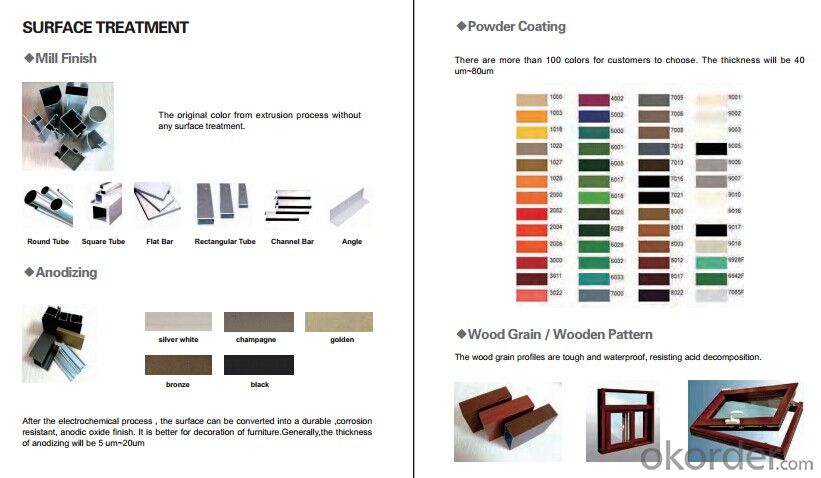
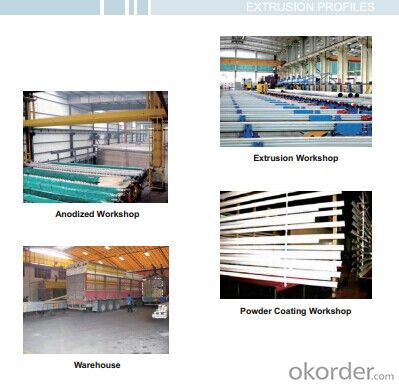
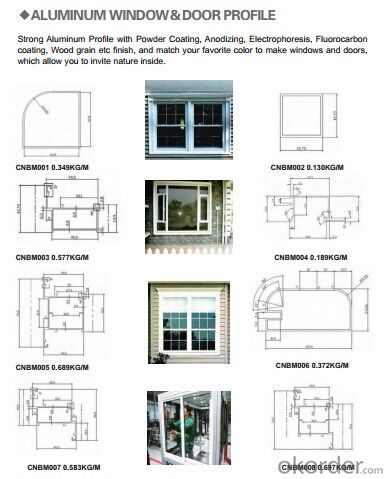
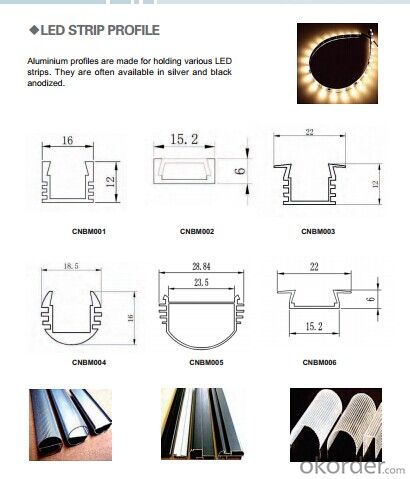
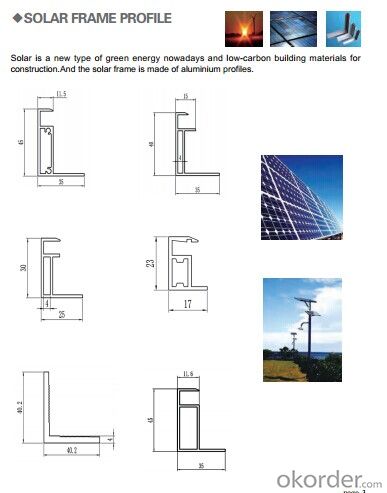
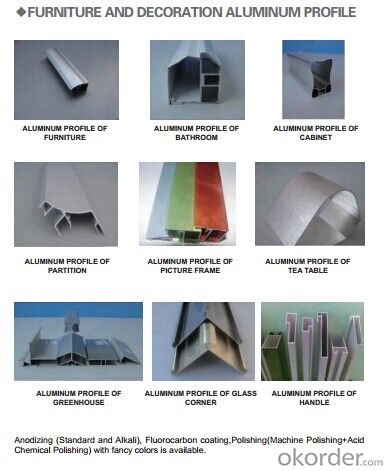
- Q: This question asks for methods to reduce waste associated with the production and utilization of aluminum profiles in the construction industry.
- <p>To minimize waste during the production and use of aluminum profiles in construction, one can adopt several strategies: 1. Optimize production processes to reduce material waste by using precision cutting and advanced manufacturing techniques. 2. Implement recycling programs to repurpose scrap aluminum, reducing the need for raw material extraction. 3. Design buildings with modular aluminum components that can be easily disassembled and reused in future projects. 4. Educate construction workers on proper handling and storage to prevent damage and waste. 5. Use computer-aided design (CAD) to accurately plan material requirements, minimizing offcuts. 6. Choose sustainable aluminum sources and suppliers that prioritize waste reduction. 7. Regularly audit and update production methods to incorporate new waste reduction technologies and practices.</p>
- Q: Tips for identifying aluminum profiles
- First of all, to see whether the aluminum profile has obvious distortion, the surface is smooth and smooth, there is no crack or boldness of vision, scratches, burrs, and if found, some super good, do not buy.Secondly, it is necessary to carefully check the color of aluminum surface, whether there are different shades of color, there is color difference, that is, the quality is not pass.
- Q: This question asks if aluminum profiles can be recycled through existing recycling programs or facilities in the user's local area.
- <p>Yes, aluminum profiles can typically be recycled using existing recycling programs or facilities. Most recycling centers accept aluminum, and aluminum profiles are no exception. However, it's always a good idea to check with your local recycling program to confirm their specific guidelines and requirements. Some facilities may require aluminum profiles to be clean and free of any non-aluminum parts before recycling. You can also look for local scrapyards or metal recycling businesses that specialize in aluminum and may offer better rates for your aluminum profiles.</p>
- Q: Are aluminum profiles suitable for use in electronics manufacturing?
- Yes, aluminum profiles are suitable for use in electronics manufacturing. Aluminum is a lightweight and durable material with excellent thermal conductivity, making it ideal for use in electronic components and enclosures. It also offers good electromagnetic shielding properties. Additionally, aluminum profiles can be easily customized and fabricated to meet specific design requirements, making them a popular choice in the electronics industry.
- Q: What are the advantages of using aluminum profiles in the aviation industry?
- There are several advantages of using aluminum profiles in the aviation industry. First and foremost, aluminum is a lightweight material. This is crucial in aviation as it helps in reducing the overall weight of the aircraft, which in turn leads to improved fuel efficiency. By using aluminum profiles, aircraft manufacturers can design and construct lighter structures without compromising on strength and durability. Additionally, aluminum exhibits excellent corrosion resistance. This is especially important in the aviation industry where aircraft are exposed to harsh environmental conditions, such as high humidity, temperatures, and saltwater exposure. Aluminum profiles can withstand these conditions, preventing corrosion and ensuring the longevity of the aircraft. Moreover, aluminum profiles offer high strength-to-weight ratio. This means that they provide a strong and rigid structure while remaining lightweight. This property is crucial for ensuring the structural integrity and safety of the aircraft. Aluminum profiles can withstand the stresses and loads experienced during flight, contributing to the overall safety of the aircraft. Furthermore, aluminum is a highly malleable material, making it easy to shape and form into complex designs. This property allows for greater flexibility in aircraft design, enabling manufacturers to create aerodynamic and efficient structures. Aluminum profiles can be easily fabricated, welded, and joined, providing ease of manufacturing and assembly in the aviation industry. Lastly, aluminum is a highly recyclable material. As sustainability becomes increasingly important, using aluminum profiles in aircraft construction helps to reduce carbon footprint. Aluminum can be recycled and reused multiple times without losing its beneficial properties, making it an environmentally friendly choice. Overall, the advantages of using aluminum profiles in the aviation industry include lightweight construction, corrosion resistance, high strength-to-weight ratio, flexibility in design, and recyclability. These properties make aluminum an ideal material for aircraft manufacturing, contributing to improved fuel efficiency, safety, and sustainability.
- Q: What specific criteria or standards must be met when employing aluminum profiles in commercial construction?
- <p>Yes, there are special requirements for using aluminum profiles in commercial buildings. These include adherence to building codes and regulations, which vary by region. Profiles must meet specific strength and durability standards to ensure structural integrity. They should also comply with fire safety and energy efficiency requirements. Additionally, the profiles need to be resistant to corrosion and weathering, and must be compatible with other building materials. Aesthetic considerations, such as color and finish, are also important to match the building's design. It's crucial to work with certified suppliers and follow proper installation procedures to meet these requirements.</p>
- Q: What are the different assembly options available for aluminum profiles?
- There are several assembly options available for aluminum profiles, including mechanical fastening methods such as screws, bolts, and rivets. Additionally, adhesive bonding and welding techniques can also be used to join aluminum profiles together. The choice of assembly method depends on factors such as the desired strength, aesthetics, and ease of disassembly if required.
- Q: Can aluminum profiles be used for conveyor belts?
- Yes, aluminum profiles can be used for conveyor belts. Aluminum profiles are lightweight, durable, and have good corrosion resistance, making them suitable for conveyor belt applications. They also offer flexibility in design and can be easily customized to meet specific conveyor requirements.
- Q: Are aluminum profiles suitable for electrical grounding applications?
- Yes, aluminum profiles are suitable for electrical grounding applications. Aluminum is a highly conductive material that allows for efficient flow of electrical current, making it an ideal choice for grounding systems. Additionally, aluminum profiles offer excellent corrosion resistance, durability, and cost-effectiveness, making them a reliable option for electrical grounding applications.
- Q: Are aluminum profiles recyclable?
- Yes, aluminum profiles are recyclable. Aluminum is a highly recyclable material, meaning it can be melted down and reused multiple times without losing its quality. Aluminum profiles, which are used in various applications such as construction, transportation, and manufacturing, can be easily recycled by collecting them from end-of-life products or scrap material and sending them to a recycling facility. The recycling process involves shredding the aluminum profiles into small pieces, removing any impurities, melting the aluminum, and then casting it into new profiles or other aluminum products. Recycling aluminum profiles helps to conserve natural resources, reduce energy consumption, and minimize environmental impact compared to producing new aluminum from raw materials.
Send your message to us
Aluminum Profiles for Sale - Perfiles en Colors
- Loading Port:
- China Main Port
- Payment Terms:
- TT OR LC
- Min Order Qty:
- -
- Supply Capability:
- -
OKorder Service Pledge
OKorder Financial Service
Similar products
Hot products
Hot Searches
Related keywords
